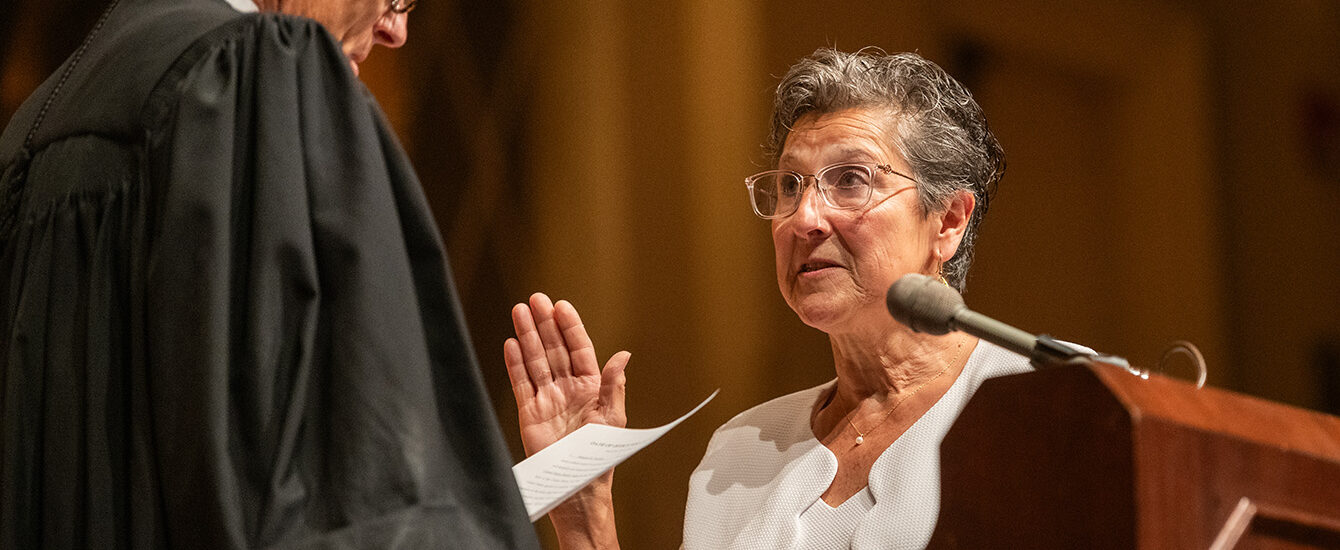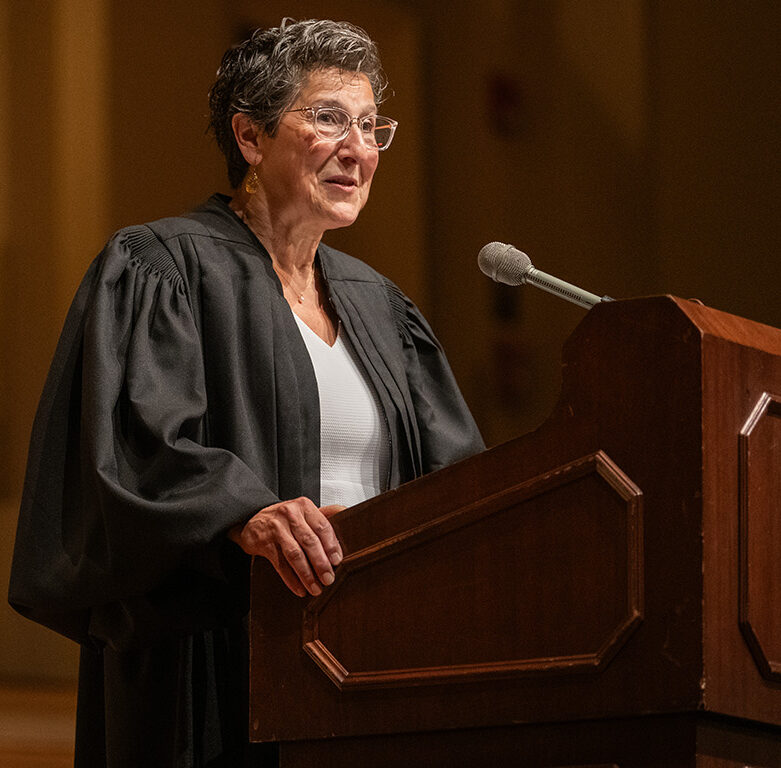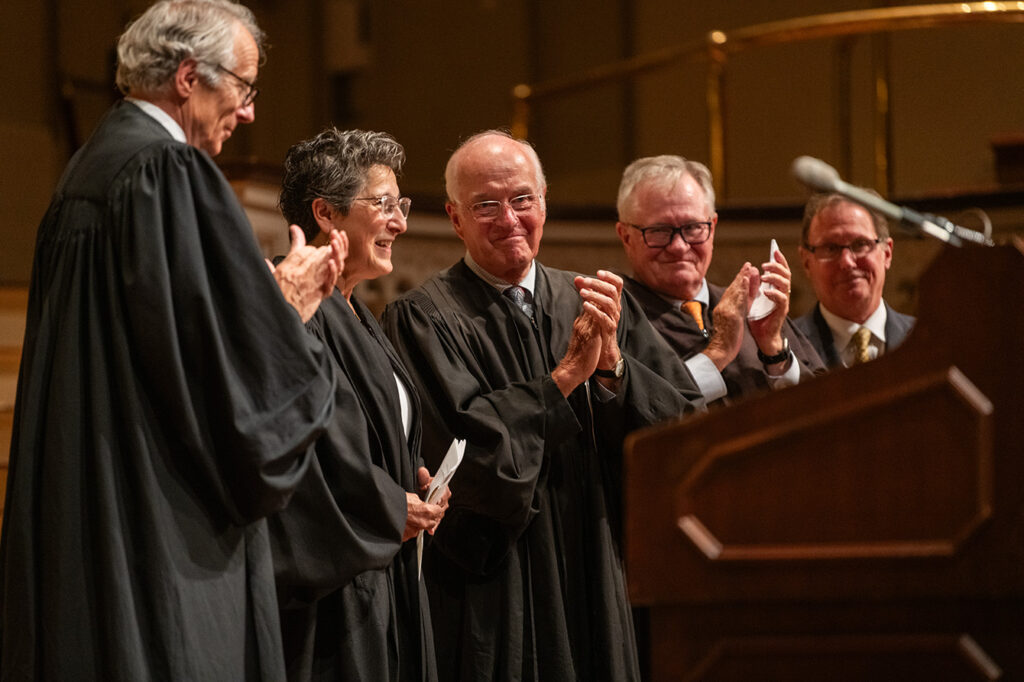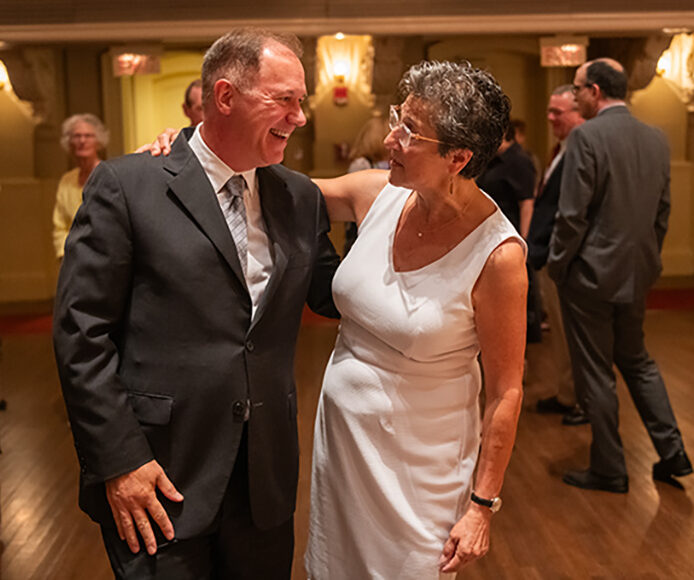
‘I’m going to be fair, and I’m going to bring a different voice.’
When she was teenager, Margaret Guzman ’89 wrote a letter to the Boston Red Sox offering to be the team’s first batgirl, just for a day. Though team manager Don Zimmer gently declined her request, Guzman, in a couple of paragraphs, had made a compelling case for herself.
It was far from the last argument she would deliver … or consider. As a public defender and then as a private-practice lawyer in Worcester, Guzman proved to be a fierce advocate for her clients, someone you’d want on your side in the courtroom.
Later, as a Massachusetts District Court judge, she carefully weighed the evidence and the arguments presented to her before rendering decisions from the bench in courtrooms throughout the state. She was very good at her job and could easily have kept at it until retirement.
Then the President of the United States came calling.
On March 3, 2023, after being nominated by President Biden for a seat on the federal bench and confirmed by the U.S. Senate, Guzman received her commission as a United States District Court Judge. She was sworn in on August 8 at Mechanics Hall in a ceremony attended by family, friends, and colleagues, who were also celebrating a piece of history: Guzman is the first person of Hispanic heritage to serve as a federal judge in Massachusetts.
“I’m going to be fair,” she says. “And I’m going to bring a different voice.”

Guzman’s path to the bench was unconventional. Born in Worcester, she was one of eight children raised by a single mother after her parents divorced. While her family didn’t have much, getting by on food stamps and free school lunches, her mother conducted herself with grace and dignity and expected the same from her children. She insisted that Margaret, always an excellent student, would go on to do great things.
Despite earning top grades in high school, Guzman didn’t have the financial resources for college and went to work in a series of jobs, including as a mortgage banker in Florida. She was successful at it, but unfulfilled. One day, a friend asked if Margaret would accompany her to a meeting with a lawyer. The woman’s son had been arrested for burglary, and the public defender wanted to review the case with her.
“I went into this meeting in a government building in Miami with every trope about public defenders in my mind: I expected some old burned-out guy who was unfamiliar with the case and probably overwhelmed. But this lawyer was young and energetic and knew all about the case — he really betrayed the stereotype,” she recalls.
“I hadn’t known it, but I was looking for a spark in my life. And as soon as I met this young man, I thought, ‘That’s what I want to be. I want to be a lawyer.’” She laughs. “It’s so strange, because he was the first lawyer I’d ever met!”

Guzman left the mortgage business, returned to the Northeast and, at the age of 25, enrolled in the University of Southern Maine in Portland. Over the course of a year and a half, she retained her standing as a high-caliber student while also holding down jobs at a restaurant and daycare facility. While studying for a semester in Newcastle, England, she wrote a letter to Clark University inquiring about admission.
“Clark was always my North Star,” she recalls. “My grandmother had worked as a secretary to the president of Clark, and for me, there was no other college. They looked at my grades, and they were very happy to have me come.
“I arrived at Clark as a second-semester sophomore, a government major, and I was enamored with the place — it was a buffet of the best things I could learn. It was like walking on air.”
Money, as always, was tight, and she worked three jobs while carrying a full course load. But her professors continually inspired her in the classroom. At the urging of Professor Sharon Krefetz, she completed her senior thesis, a comprehensive examination of the effectiveness of Massachusetts’ Chapter 40B “anti-snob zoning” law, which was observing its 20th anniversary.
A summer internship in the Worcester public defenders’ office solidified her law aspirations, and after graduating from Clark in 1989, she went on to earn her J.D. from Boston University School of Law.

Guzman returned to Worcester and was hired as a public defender in Superior Court, the job she was destined to perform since she sat in that Miami law office years earlier and listened to the attorney outline his defense of her friend’s son.
“The minute I stepped into the courtroom, I knew that was where I was intended to be,” she says.
This often meant giving voice to people who were overlooked and under-resourced. She relished the battle on their behalf, and did it well for 17 years. Despite repeated overtures from the District Attorney’s office to join their team as a prosecutor, she was adamant that she belonged on the defense side.
There were personal challenges along the way. Guzman cared for her ailing mother until her death, and for three years, she served as guardian to a sister’s six children. Professionally, she was thriving, but she could only stretch her public defender’s salary so far.
“I was one of the most experienced criminal trial attorneys in the city. I had ten murder cases already under my belt, and I was driving a car with close to 200,000 miles on it,” she remembers.
She reluctantly left the public defender’s office to open her own practice as a defense attorney, working several high-profile murder cases that further elevated her reputation as a smart, tough advocate.
In 2009, Guzman was appointed a Massachusetts District Court judge, and would go on to serve in 32 of the 62 district courts in the Commonwealth.
“I had a hard time finding that neutral zone at first,” she says. “I had to work at going from a warrior to someone who is middle of the road. I’d say it took me to my fourth year on the bench to achieve the level I wanted to be at.”
She gladly served in cities and towns where English was often the second language and the poverty was suffocating. “There were cases upon cases; serious stuff. You’d work nonstop for two hours, take the morning break, and you’d return to find just as many, if not more, people in court. It was like a leaky boat all the time.”
Guzman had seen the cycle of poverty perpetuated in courtrooms, where the poorest were serially penalized for nonpayment of fines and fees that they had no possibility of paying. She served in leadership roles on numerous Trial Court committees, including Judicial Education, Race and Ethnic Fairness, and the Supreme Judicial Select Committee on Implicit Bias that examined the roots of decision-making through the lens of not only justice, but compassion. “The courts came to see what many people had been saying for years, which is that we have two versions of justice, and we shouldn’t be part of that.”
When Guzman was approached about the possibility of a federal appointment, she didn’t give it much weight. She had no political connections — “I didn’t belong to any secret society,” she laughs. “I didn’t know anybody” — and her background as a public defender made her a longshot, particularly among conservative legislators.
Still, at the request of Massachusetts Senator Elizabeth Warren, she completed the 40-page application and tossed her robe into the ring.
“Once I agreed to file the application, I wanted it,” she recounts. “Look, I had a great job that I could have kept at, but I knew there was something else for me. I felt that way before COVID, and then when COVID hit, it was like, ‘Okay, this is telling me to pay attention to the universe.’”
The vote in the Senate confirmation hearing broke along party lines, 49-48, with Vice President Kamala Harris casting the tie-breaker.
“My mother is smiling somewhere,” Guzman says. “And she’s saying, ‘I knew it. You should have listened to me.’”


